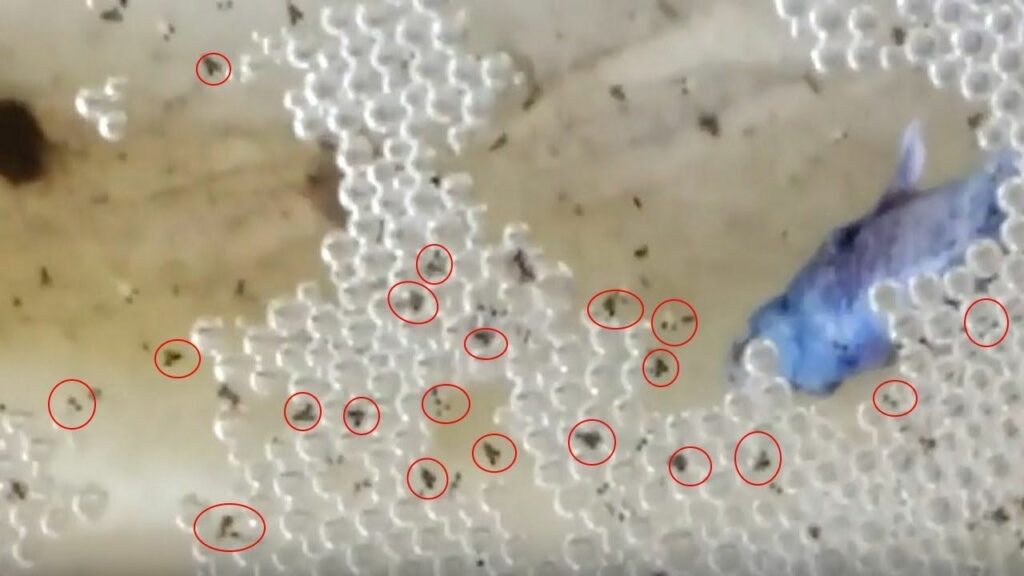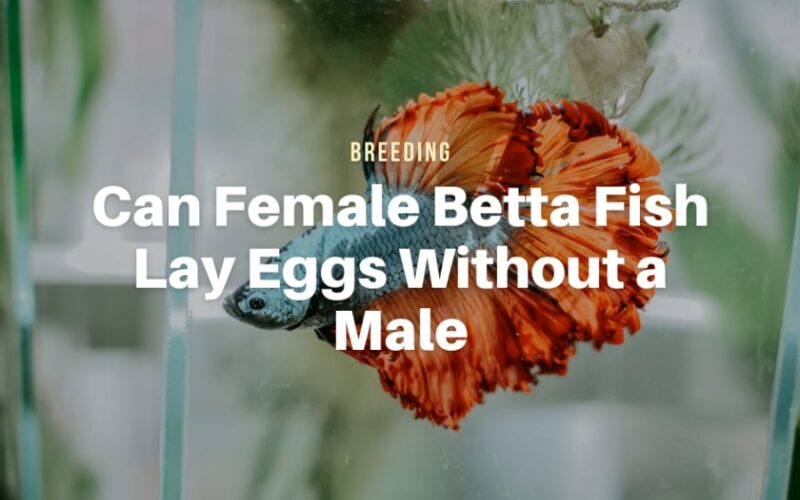Once they reach sexual maturity, fish reproduce just like any other animal that lives on the water, from sharks in their natural environments to Betta fish that people keep as pets. In most cases, sexual reproduction in this species takes place when a female and a male mate.
However, can female Betta fish lay eggs without a male present? If you want to find out the answer, let’s try to understand what the author of this article is trying to say.
Can Female Betta Fish Lay Eggs Without a Male?
Some people may find this strange or even shocking, but surprisingly, the female betta fish can become pregnant even when the male is not present. These eggs, however, will not develop into a viable breeding population.
Instead of throwing them away, the female fish will absorb them. This is because she continues to make these things. You will have to deal with eggs if your fish lays them without the assistance of a male and does not eat them.
This species can become pregnant between the ages of 4 and 5 months. She is able to lay eggs after going through the conditioning process and seeing the male because she believes mating will come shortly.
A female betta fish can store eggs in her ovipositor for approximately 11 days. She keeps being pregnant for a while longer before she starts looking for a partner who can help her give birth.
A female will lay the same number of eggs whether the eggs are fertilized by a male or not. It usually takes about two days for a spawning egg to hatch. If the betta does not mate, the eggs will not hatch, and no new fish will be born.
Betta fish must mate in order to produce fertile eggs that can develop into new fish. The male will “squeeze” the female during courtship and dancing to get her to release her fertile eggs. The male will fertilize the eggs outside of the female’s body after mating.
How Do Female Betta Fish Lay Eggs Without a Male?
When you consider the aforementioned information, it is inevitable that the thought crosses your mind to wonder how something like this could take place.
Since the female of this species is capable of inducing the process on her own, she can become pregnant even if she does not have a male companion. As a result, mating with males is not required in order for the process of egg production to take place.
In addition, between the ages of four and five months, it begins to produce eggs and demonstrates its capacity to mate. The female accidentally lets these fertilized eggs fall out of the ovipositor as they are being released.
Furthermore, a fish in good health can push them out of its body by contracting its muscles and forcing them out.
How Can You Tell If A Female Betta Has Eggs?

As fish keepers, it is imperative that we are able to determine whether or not the fish are actually laying eggs. There are some clues that you can decipher in order to discover the answer.
The special organ
These fish have a special reproductive organ known as an ovipositor, which allows them to reproduce. The females have a small gill sac that they use to expel their eggs after they have finished producing them.
This organ can be found on the front of the body, just behind the ventral fins of the female, on the anterior surface of the body.
Just prior to the process of laying eggs, the ovipositor of a female Betta fish will transform into a brilliant white color. This is a clear indication that it is now the appropriate time to let the eggs hatch.
Their stripes
Female Betta fish are said to be ovulating when they are at the moment of laying eggs. When a female Betta is pregnant and ready to lay eggs, she will develop five to six lighter vertical stripes down her body.
These markings may lack sharp definition and have fuzzy edges. So, if your fish has formed these stripes for the first time, she is likely to be laying eggs soon.
Enlarged belly
Your female Betta, like the females of all other species, will grow rounder than usual when she’s carrying her young. If your fish was not very large before, you would definitely be able to notice this change in its physical appearance.
Forming a bubble nest
The female betta tries to make a nest made of bubbles for their young even though the male betta is responsible for doing so.
Just like the male partner, she can use this to keep the eggs safe. So, she starts the process by blowing bubbles into the water, which slowly forms a layer on top.
Why do Female Betta Fish Lay Eggs Without a Male Betta?
There are a few different reasons why a female of this species can become pregnant without the presence of a partner.
The ability to produce eggs on its own
A female Betta can initiate her own pregnancy. She can have babies on her own and simply throw the eggs in the water without her partner meddling.
Nutrition and environment
When a female is being prepared for reproduction, she is fed high-quality fish food that promotes robust health.
Good nutrition helps her develop normally, but the hospitable conditions and comfortable temperature also contribute to her healthy growth. A healthy female Betta fish will keep making eggs until a partner mates with them.
Fertilization from outside sources
Bettas are fish that lay eggs in the shape of tiny round beads and release them after mating. They have no concrete concept of pregnancy because they release unfertilized eggs. They also need to have fertilized eggs to get pregnant.
He secretes milt from his body to fertilize an egg. Furthermore, after mating with the partner, the fertilized eggs are released into the water.
This disproves the idea that Betta fish can get pregnant by getting fertilized outside of their bodies, but it does prove that they can collect eggs inside their bodies and get pregnant that way.
Can Female and Male Betta Fish Live in the Same Tank Together?
Bettas, also known as Siamese fighting fish, are notoriously violent toward their own species, particularly males. Male Betta fish will almost certainly kill each other when housed together, and some males will even attack and kill females, even when they are supposed to be breeding.
It is possible to keep bettas in harem tanks (at least one male with multiple females) if you know what you’re doing, but it can be tricky if you don’t. You’ll need some experience as well as a backup tank in case the first one fails.
Finally, keep in mind that while male and female bettas can be kept in the same tank, they will be much happier if kept in separate tanks.
You are now aware that a female Betta fish can lay eggs even if she is not paired with a male. Those eggs, however, have not been fertilized and will not grow into fry. So you should read the sections until you understand everything, just in case you find yourself wondering what’s going on with your fish.



